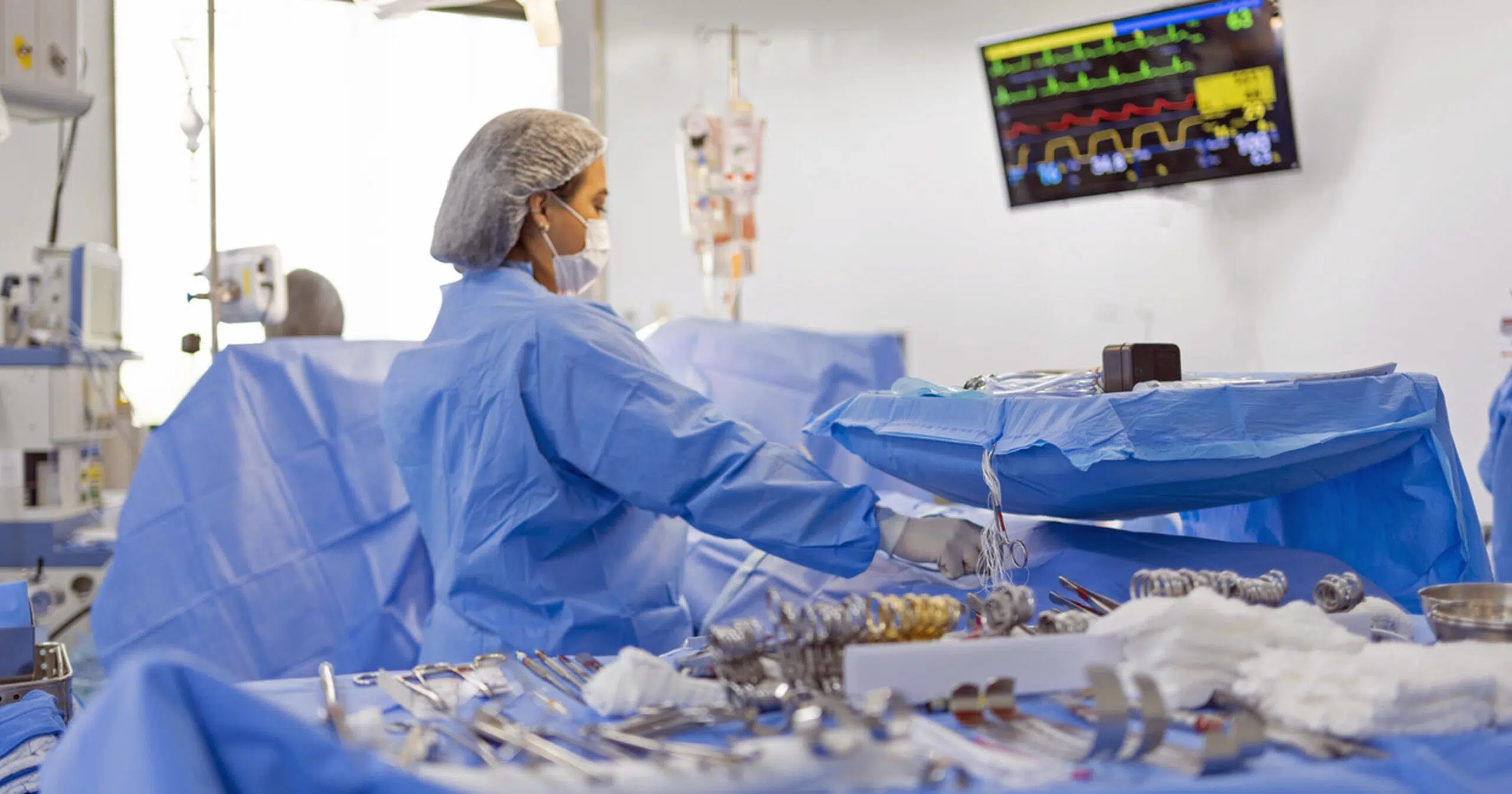Surgeons can’t do it alone in the operating room (OR), which means you can find exciting and impactful careers in healthcare working on their teams. OR personnel often includes a small army of nurses, anesthesia specialists and a group of allied health professionals known as surgical assistants and technologists.
With many allied health fields among the fastest-growing healthcare careers in 2025, Vivian Health explores five popular career choices in surgical technology. We cover the education and certification requirements to enter these surgical tech specialties, provide average salaries for staff and travel roles and highlight key states that offer the best pay to help you decide if one is right for your career goals.
Surgical Technology Demand and Salaries
Work in surgical technology continues to be in demand. The Bureau of Labor Statistics projects that surgical assistants and technologists will experience job growth of 6% and an average of 8,700 job openings yearly between 2023 and 2033. That’s faster than the average job growth of all U.S. occupations combined. With this kind of demand, it’s typical for surgical technology professionals to earn pay ranging in the top half of U.S. workers—above $42,220 per year—and possibly much more.
Salaries in surgical tech specialties vary by location, job type (e.g., travel vs. staff positions), education and experience level. For instance, data from Vivian Health on December 9, 2024, showed that the average hourly wage for a staff surgical technician was $22.66, while the average hourly rate for the more highly educated Certified Surgical Technologist was $34.84.
Pursuing certifications and a surgical technology specialty is a great way to increase your salary potential, expand your knowledge base and position yourself as a key member of a vital healthcare team. Some careers within surgical technology require a relatively short educational commitment, offering an ideal path to enter a healthcare profession and start earning a decent living quickly.

Image by stefamerpik on Freepik
5 Surgical Technology Career Options
Let’s explore the roles within common surgical technology specialties, how education and responsibility shape opportunities and the specialized roles that often come with greater earning potential. We’ll also analyze the salary data for these specialties, ranging from roles that require less education and responsibility to those providing higher earnings in specialized roles. We collected our data from Vivian Health’s salary calculator on December 9, 2024, with the numbers below depicting the salaries and job availability at that time. To calculate weekly staff wages, we multiplied the hourly rate by a 40-hour work week and multiplied that by 52 weeks to get the annual rates.
1. Surgical Technician
Surgical Technicians collaborate with the surgical team to prepare and maintain the space, manage instruments and ensure procedures run seamlessly. Their accuracy and calm demeanor under pressure are essential for patient safety and the success of surgeries.
Entering this field requires a relatively short post-secondary education in a program that teaches the foundational skills needed to assist during surgeries. These programs, offered by technical schools, community colleges and hospitals, combine classroom learning with hands-on clinical experience.
Vivian researched job salaries based on open roles posted on our site during the week of December 9, 2024. During our research time frame, surgical technician salaries averaged $22.66 per hour ($906 per week), totaling $47,133 yearly in a full-time role. Meanwhile, surgical technician travel salaries averaged $1,882 per week, offering a considerable premium over staff roles for those willing to move around the country to places where surgical technicians are acutely needed.
During the same period, various health systems and healthcare recruiters across the U.S. posted 20 job openings on Vivian for staff surgical technicians and well over 100 listings for travel surgical technicians. Opportunities abound across the country, including travel roles that can maximize your pay in the following states.
Top Five Best-Paying States for Travel Surgical Technicians
| State | Average Weekly Travel Salary | Max Weekly Travel Salary |
| Wisconsin | $2,242 | $3,069 |
| Connecticut | $2,190 | $2,336 |
| Massachusetts | $2,152 | $2,720 |
| Minnesota | $2,136 | $2,745 |
| Vermont | $2,066 | $2,440 |
Based on jobs posted to Vivian Health during the week of December 9, 2024.

2. Surgical Technologist
Sometimes called surgical techs, Surgical Technologists prepare operating rooms, ensure instruments are sterile and assist surgeons by passing instruments, managing supplies and supporting patient care after surgery.
Educational requirements for surgical technologists vary by state, making it essential to check specific state regulations. Typically, the path involves earning a high school diploma or equivalent and then completing a postsecondary certificate or associate degree from an accredited program. Accreditation should be from either the Commission on Accreditation of Allied Health Education Programs (CAAHEP) or the Accrediting Bureau of Health Education Schools (ABHES).
During our research, surgical technologist salaries averaged $33.55 per hour ($1,324 per week), which equals $69,784 per year. However, pay varied considerably for this job based on location and demand. For instance, surgical techs earned an average of $40 per hour or more in five states.
Top Five Best-Paying States for Staff Surgical Techs
| State | Average Staff Hourly Salary |
| Washington | $56 |
| California | $55 |
| Oregon | $50 |
| Virginia | $40 |
| North Carolina | $40 |
Based on jobs posted to Vivian Health during the week of December 9, 2024.
Meanwhile, travel surgical technologists earned an average of $1,860 weekly during the same time frame. Travel surgical techs can earn more by going to the most in-demand locations like their staff counterparts.
Top Five Best-Paying States for Travel Surgical Techs
| State | Average Weekly Travel Salary |
| Connecticut | $2,265 |
| Wisconsin | $2,243 |
| Idaho | $2,223 |
| Vermont | $2,190 |
| Massachusetts | $2,165 |
Based on jobs posted to Vivian Health during the week of December 9, 2024.
During the week of December 9, 2024, well over 100 staff surgical tech jobs and hundreds of travel surgical tech jobs were posted to Vivian. Surgical technologists have the opportunity to specialize in specific fields that can offer higher salaries. Specializations include cardiac surgery, neurosurgery, organ transplants, orthopedics, pediatrics, plastic surgery and many others.
RELATED: Surgical Technician vs. Surgical Technologist: What’s the Difference?

3. Certified Surgical Technologist
Certified Surgical Technologists (CSTs) perform critical tasks such as sterilizing equipment, passing tools to surgeons and their teams, retracting tissue to improve visibility during procedures, applying dressings and maintaining a sterile environment. While their responsibilities overlap with those assigned to surgical technologists, CSTs distinguish themselves by achieving certification. Some states have mandatory certification, licensure and/or registration for employment as a surgical technologist, while others have no requirements.
Aspiring professionals must complete an accredited postsecondary program with a certificate or associate degree. Then, to earn the Certified Surgical Technologist credential, you must meet the eligibility requirements and pass the National Board of Surgical Technology and Surgical Assisting (NBSTSA) test. Some states also recognize certification from the National Center for Competency Testing (NCCT) or surgical professionals who’ve completed a military surgical technology program.
The typical certified surgical technologist salary was $34.55 per hour ($1,382) on December 9, 2024, equating to $71,864 per year in a full-time staff position. However, CSTs could find above-average pay in three states during this period: Idaho at $51 per hour, Illinois at $39 per hour and Texas at $38 per hour.
Meanwhile, the average weekly salary for a travel-certified surgical technologist was $1,862. Travelers in this field can earn more by going to the most in-demand and high-paying states.
Top Five Best-Paying States for Travel Certified Surgical Technologists
| State | Average Weekly Salary | Max Weekly Salary |
| Wisconsin | $2,242 | $3,069 |
| Connecticut | $2,190 | $2,336 |
| Massachusetts | $2,152 | $2,720 |
| Minnesota | $2,136 | $2,745 |
| Vermont | $2,066 | $2,440 |
Based on jobs posted to Vivian Health during the week of December 9, 2024.
During our research week, health systems and staffing agencies posted over 75 certified surgical technologist staff jobs to Vivian’s jobs marketplace. Many jobs listed NCCT or CST-NBSTSA certifications as required qualifications to apply. Meanwhile, during the same timeframe, we saw just shy of 1,000 postings for travel certified surgical technologist jobs, offering a wide range of opportunities across the U.S.

4. CVOR Surgical Technologist
Cardiovascular Operating Room (CVOR) Surgical Technologists oversee the preparation for cardiovascular procedures. They ensure all equipment is set up correctly, maintain a sterile field and manage instruments and supplies throughout the procedure. Specializing in this field typically requires a minimum of three years of experience as a general surgical technologist.
Based on our data set, the average CVOR surgical technologist salary was $28.66 per hour ($1,146 per week), or roughly $59,613 annually for a full-time staff role. This pay level was lower than the average of a general surgical technologist, but this may result from the small number of postings—less than 10—for staff CVOR surgical technologist jobs on Vivian at the time of our research. A look at pay levels for travel CVOR roles may better reflect the premium pay offered to this specialty over a generalist.
The average travel CVOR surgical technologist salary was much higher at $2,119 per week, based on the more robust average of over 1,000 travel CVOR surgical technologist job listings on Vivian. That compares favorably to the $1,860 per week average for a general travel surgical technologist. Of course, travelers in this role can earn more by taking assignments in top-paying states.
Top Five Best-Paying States for Travel CVOR Surgical Techs
| State | Average Weekly Salary |
Max Weekly Salary |
| District of Columbia | $2,571 |
$3,316 |
| Washington | $2,527 |
$3,136 |
| Virginia | $2,497 |
$3,255 |
| Massachusetts | $2,354 |
$2,769 |
| New Mexico | $2,326 |
$3,136 |
Based on jobs posted to Vivian Health during the week of December 9, 2024.
5. Surgical First Assistant
Typically earning the best pay among surgical technology roles is the Surgical First Assistant (SFA). This higher salary reflects the rigor of training and experience necessary to enter this field. To become an SFA, generally, you must first be a licensed Registered Nurse (RN), certified surgical technologist or Physician Assistant (PA) with specialized training in surgical assisting. After graduating from an approved surgical first assistant program, certification through NBSTSA offers the Certified Surgical First Assistant (CSFA) credential, which is usually necessary before beginning your career.
An SFA works closely with surgeons during procedures, ensuring the safety and success of operations. They provide comprehensive support to patients throughout the surgical process, including pre-operative preparation, intra-operative assistance and post-operative care. Key responsibilities include preparing and draping patients, managing surgical instruments, suturing incisions, controlling bleeding and providing wound care.
During our research, the average surgical first assistant salary was $39.48 per hour ($1,579 per week), equivalent to $82,118 per year in a full-time position. Meanwhile, a typical travel surgical first assistant wage was $2,273 weekly.
While Vivian Health had limited job postings for staff surgical first assistants on December 9, 2024, there were over 70 travel surgical first assistant jobs on our site during our research time frame.
Top Five Best-Paying States for Travel Surgical First Assistants
| State | Average Weekly Salary | Maximum Weekly Salary |
| Missouri | $2,804 | $3,154 |
| Georgia | $2,535 | $3,029 |
| Illinois | $2,455 | $2,660 |
| Indiana | $2,310 | $3,066 |
| Michigan | $2,113 | $2,510 |
Based on jobs posted to Vivian Health during the week of December 9, 2024.
Grow Your Career on Vivian
Interested in growing your career with one of these surgical technology specialties? Explore the employment possibilities on Vivian Health’s jobs marketplace and start your career in the surgical technology field today.
Editor’s Note: This blog post was originally published in March 2023 and has been updated annually to reflect the most recent data. The Surgical Technology specialties currently listed were the highest-paying among the positions posted on Vivian Health as of this publication.










Hi. I am surgical technologist. I want to move forward and become a surgical PA, what do I need to do next?
Hello Karla and thanks for reaching out. Start by reading our Career Guide for General Surgery Physician Assistants for an overview of the education requirements and other qualifications to enter this field. Compare these requirements to what you’ve already accomplished in your current field and complete any tasks you’re lacking. We wish you the best of luck in your next career move and hope Vivian can help when you’re ready to search for your next job!
I have an bachelor degree in Psychology, but I want to be a CST. What do I need to do to obtain that certification.
Hello Ericka and thanks for reaching out! To learn more about the Certified Surgical Technologist certification, please visit our CST Certification Guide here: https://www.vivian.com/certifications/cst/. Per the National Board of Surgical Technology and Surgical Assisting (NBSTSA), applicants for the CST certification exam must either be a graduate of a surgical technology program accredited by the Commission on Accreditation of Allied Health Education Programs or Accrediting Bureau of Health Education Schools or a graduate of a military training surgical technology program. We wish the best of luck with your career goals and hope Vivian Health can help you reach those goals!